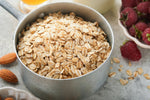
Selecting the Ideal Type of Oats for Protein Content
, by Sandesh Prasannakumar, 10 min reading time
Stay tuned, Your Favourite supplements will be back in stock soon!
Stay tuned, Your Favourite supplements will be back in stock soon!
Stay tuned, Your Favourite supplements will be back in stock soon!
Stay tuned, Your Favourite supplements will be back in stock soon!
Stay tuned, Your Favourite supplements will be back in stock soon!
Stay tuned, Your Favourite supplements will be back in stock soon!
Stay tuned, Your Favourite supplements will be back in stock soon!
Stay tuned, Your Favourite supplements will be back in stock soon!
Stay tuned, Your Favourite supplements will be back in stock soon!
Stay tuned, Your Favourite supplements will be back in stock soon!

, by Sandesh Prasannakumar, 10 min reading time
With more and more people discerning the nutritional benefits of oats, they have become a recent health fad. As life rushes by at express speed, taking time out for healthy and satisfying lunches becomes more of an ordeal for many. In this fast-paced world, oats have fortunately filled that gap. With a high fibre content and numerous potential health benefits, including assisting in weight reduction and lowering levels of bad cholesterol in the blood, oats pay off. Oats now also win applause for their protein content. But there are many kinds of oats out there, such as rolled oats, steel-cut oats or instant oatmeal; it is difficult to figure out which oats are best for protein. In order to fit your dietary needs better, it is essential to understand the protein content in each type of oat quite clearly and then accordingly pick out the oat that most suits you.
Oats have lately become a favourite breakfast meal for many as they have great taste and flexibility combined with a very impressive nutritional profile. However, the primary concern here is - what magic components exactly make them so nutritious? Here we go in the world oats to discuss the multifactorial health values brought by them.
The nutritional content of oats can be greatly affected through processing procedures. One should look for oat brands whose manufacturing method leaves more of the bran and germ part, resulting in more nutrient-dense oat options compared to their heavily processed counterparts.
Before deciding on which oats are best for protein, you must learn the several benefits they offer.
If you add oats to your diet, you are loading up on a whole range of health benefits. Therefore, oats should be your go-to breakfast since you need all the energy you can access every day of the week.
Read Also : Evaluating the Protein Content of Oats
Protein is a macronutrient which carries out the functions of healing, building cells, and managing hunger, and it allows the body to perform many other functions properly. Although most people do not regard oats as a vital source of proteins, they can still make millions to fulfil their daily protein needs. While they are not considered high-protein grains, the acceptable amount of protein present in oats combines perfectly with some other sources, such as nuts or seeds, to create the entire protein profile. Proteins found in oats, combined with the other nutrients, constitute a nourishing and filling meal whose contribution to muscle recovery, weight management, and well-being is notable. Conquering the protein power of oats is a great strategy to enrich daily meals and integrate additional trace elements into your everyday nutrition.
Although oats are mainly known for their high fibre content, they also offer a certain amount of protein for our daily intake. Different from some grains, such as quinoa or brown rice, that contain as much as 25% protein, oats are not identified as high-protein grains. Yet they can remain important for those on plant-based diets or those seeking more protein from whole food sources.
While thinking about which oats are best for protein, you must explore the different varieties it offers.
Processing methods play a crucial role in determining which oats are best for protein. The processing methods are sensitive as regards the resolution of the protein content of oats. When it comes to quality, minimally processed options such as whole oat groats have an advantage over the starchy endosperm in that they still contain most of the bran and the germ that naturally contains higher concentrations of protein. As processing goes along, there is an increase in the deprivation of these protein-providing outer layers, which results in a decrease in protein content on the product end.
Once you understand the difference in protein content between oat varieties, you can deduce which oats are best for protein. Here's how to make an informed decision.
The secret to increasing the protein content in your oat breakfast includes incorporating it with other protein-rich sources. Here are some ideas:
As you take into account these aspects and accommodate them with protein-rich ingredients in your oat breakfast, you are able to have a delightful and healthy meal that keeps you full and energised all morning.